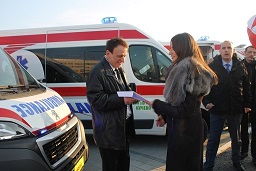Today, the Serbian Government Ministers Nela Kuburovic and Zlatibor Loncar presented the keys to 21 ambulances, equipped with the latest equipment and a “mobile hospital”, to the representatives of 15 hospitals in Serbia. These vehicles were purchased with the funds collected from uninitiated criminal prosecutions (opportunity) in the total of approximately RSD 350 million, which were distributed to beneficiaries on the basis of a competition opened by the Ministry of Justice in March of this year.
According to Minister Kuburovic, about 1,000 beneficiaries participated in the competition, out of which 67 received funding based on projects that had been submitted.“Close to RSD 180 million were allocated for health care, and more than 22 medical institutions received adequate funding”, Kuburovic stated, noting that by the end of the year all projects that had received funding on a competitive basis would be implemented. She pointed out that the Ministry of Justice was monitoring the implementation of projects, i.e. whether funds were being spent appropriately and whether the projects were being implemented within the deadline, adding that, otherwise, there was the possibility that the funds would be withdrawn.
Kuburovic announced the launching of a new competition, for the allocation of close to RSD 350 million that had been collected during 2016, for January. She pointed out that the system of allocation of funds from opportunity was introduced after the amendments to the Criminal Procedure Code (CPC) in 2014. “Until then, the prosecutor’s office had discretionary jurisdiction to determine where the funds would be allocated, i.e. for which humanitarian purpose. However, since it is estimated that these situations create opportunities for corruption, the Ministry of Justice has initiated amendments to the CPC in order to allocate funds in a transparent manner”, she said.
The Minister of Health Zlatibor Loncar stated that the new ambulances were of great significance for the health sector, as they were equipped to the highest standards. “These are the so-called “mobile hospitals””, he said, recalling that the vehicles in local hospitals and health centres were of poor quality, since they had each crossed half a million or more kilometres. “So far”, he said, “64 vehicles have been procured, which have transported 11,000 citizens in five months.”
Loncar pointed out that two days before, the Ministry of Health had reached an agreement with the Minister of Finance to replace all ambulances in Serbia. “We will initiate the procurement procedure for two vehicles for prematurely born babies as early as January. One will be delivered to Nis and one to Kragujevac, and they will include special equipment and incubators”, Loncar noted.
The first beneficiaries of funds deriving from opportunity, altogether 67, are predominantly schools, social welfare centres, health centres, hospitals, homes for the elderly and nursing homes, as well as the Centre for Human Trafficking Victims Protection, the Republic Institute for Protection of Cultural Monuments, Ministry of Health, Association of parents-guardians, children and friends of children suffering from malignant diseases, Belgrade Flower Festival, Juvenile Correctional Institution in Krusevac and so-forth.
The essence of opportunity is that when a person reaches an agreement with the prosecutor on having criminal charges against him/her dropped and the prosecutor refraining from prosecution, the prosecution determines the sum that must be paid for humanitarian purposes on the basis of opportunity.
The money paid by order of the prosecutor is collected in one place - the Treasury, namely in a sub-account for these purposes. The money continues to be allocated on the basis of competitions run by the Ministry of Justice, and in a manner suggested by the respective Commission of the Ministry and confirmed by the Government of Serbia.
Source: Тanjug

